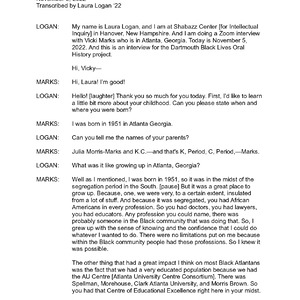Vicki Marks in Her Own Words
It was everything about the beauty and wonder and the excellence of Black people I was surrounded by. So I always had a great deal of confidence in my abilities.
Vicki Marks
Interview Summary
Vicki Marks was born in Atlanta, Georgia. Growing up, she remembers biking and playing baseball with her friends and siblings. Even as a child, she was determined to walk her own path, even if she got in trouble for it. In a move that would foreshadow the courage and pioneering spirit for which she would become known, she was involved in desegregating a local, White high school. She was a great student in school. She found that she was very analytic, perhaps an early indicator that she would major in economics at college. Despite being surrounded by examples Black excellence in her Atlantan suburb, there were a few but memorable occasions where racism made ugly stains on an otherwise idyllic childhood.
Vicki always knew she was going to go to college, but she did not have a lot of guidance applying, especially since she eschewed the local HBCUs preferred by most people she grew up with. She eventually decided on Smith College in Massachusetts. Vicki credits her experiences in an all-white high school for her smooth transition to life at Smith. In her sophomore year, she learnt about the exchange program at Dartmouth and was intrigued. Dartmouth was not unfamiliar to Vicki, as she had made several friends of Dartmouth men when they made weekend visits to her school or vice versa. During her exchange year, Dartmouth decided to go coeducational. Vicki applied and, along with the six other Black women in the program, was accepted for her senior year. Vicki enjoyed her time at Dartmouth, in large part due to the unified and supportive Black community.
After Dartmouth, Vicki went on to get her MBA at the University of Chicago. She worked for several Fortune 500 companies over her long and illustrious career in marketing. She was involved in many philanthropic initiatives, including helping Dartmouth to interview prospective students. Now retired, she hopes that her experiences will make it easier for women of colour to follow in her footsteps.

